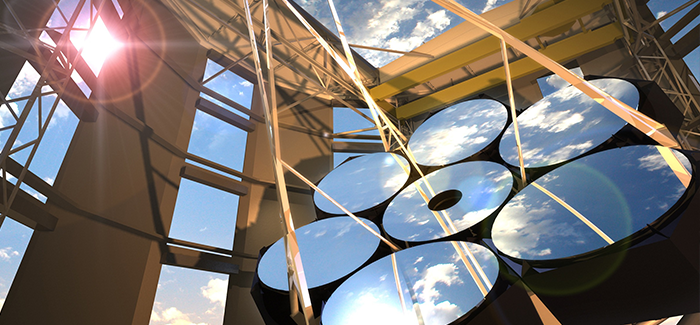
This rendering shows how the Giant Magellan Telescope’s six large mirrors will encircle a seventh. (Rendering courtesy the Giant Magellan Telescope Project)
The Physical Sciences Division looks to the future.
In October UChicago formally launched the public phase of the University of Chicago Campaign: Inquiry and Impact, a $4.5 billion fundraising campaign expected to last through 2019. The quiet phase has already raised more than $2 billion, including 182,000 gifts from alumni and friends.
The campaign serves as an important moment for the division, says dean Rocky Kolb. “We pioneer scientific discovery; philanthropists provide us the means, and in doing so become an integral part of the work we do.”
As part of the campaign, the Physical Sciences Division is raising funds to advance a set of ambitious goals, focusing on:
pursuits—developing ambitious research agendas and programs, maintaining and fostering the division’s tradition of discovery;
people—attracting and supporting the best students, postdoctoral fellows, and faculty by building and advancing core facilities and equipment and promoting a strong collaborative community;
place—serving as an intellectual destination where researchers from around the globe present and hone their breakthroughs.
These initiatives, Kolb says, will continue—and bolster—the PSD’s history of producing research and scientists that push boundaries, ask difficult questions, and create new fields of study.
Below are the division’s departmental campaign priorities.
Big glass
Astronomy and Astrophysics: Telescopes are time machines, and the biggest and most advanced telescopes bring us ever closer to the big bang. Construction is expected to be complete by 2020 on the Giant Magellan Telescope, a segmented-mirror scope in the Chilean Andes Mountains with more than 12 times the light-gathering area of the Large Binocular Telescope in Arizona, currently the world’s largest telescope. The University of Chicago has pledged a significant stake in the GMT as well as in the two existing Magellan telescopes, ensuring that UChicago astronomers and astrophysicists have access to the best observational equipment in the world.
Systems research and innovation hub
Computer Science: Computing devices have transformed nearly every aspect of our lives, yet computer systems are still wasteful, fragile, and insecure. The goal of the computer science department’s new CERES Center is to engineer “unstoppable computing” by exploring hardware and software architectures that exceed current energy efficiency and function, building resilience to large-scale failure, and achieving total defense against malicious attacks.
Planet habitability
Geophysical Sciences: Understanding planet habitability—the ability to develop and sustain life—is crucial to human existence here and the search for life out there. The geophysical sciences department studies the complex dynamics among life, rocks, oceans, and atmospheres on Earth and creates models for potential exoplanet habitability, which can then be tested with increasingly powerful telescopes.
Kadanoff Center
Physics: Condensed matter physics deals with the physics of everyday and exotic materials. The Kadanoff Center for Theoretical Physics, which has historically focused on particle physics, aims to strengthen its efforts in condensed matter physics, uniting experts in string theory, general relativity, condensed matter physics, and hydrodynamics to study problems shared by both fields.
Math labs and postdoctoral instructorships
Mathematics: The mathematics department seeks to revolutionize the way math is researched and taught by establishing math laboratories. The department also plans to create a cadre of postdoctoral instructors—recent PhDs who have exhibited exemplary teaching skills—who will provide expert-level education for its growing undergraduate mathematics population.
Data analysis
Statistics: Computation is vital for the future of all research, the humanities and social sciences as well as physical and life sciences. The PSD is providing undergraduates with training to understand and use computation in their post-College lives. Based on student input and demand, the College has approved a new major in computation and applied mathematics that includes course work in the departments of statistics (which leads the initiative), mathematics, and computer science.
Project Prometheus
Chemistry: Project Prometheus represents the next step in a decades-long chemical research revolution. Solar energy could eliminate our reliance on fossil fuels, but today’s methods of harvesting and storing it are inefficient and incomplete. The project focuses on capturing sunlight, storing energy in chemical bonds, and chemically converting artificial photosynthesis products.
For more information, a complete list of campaign goals, and information on how to give to the PSD, visit campaign.uchicago.edu.
